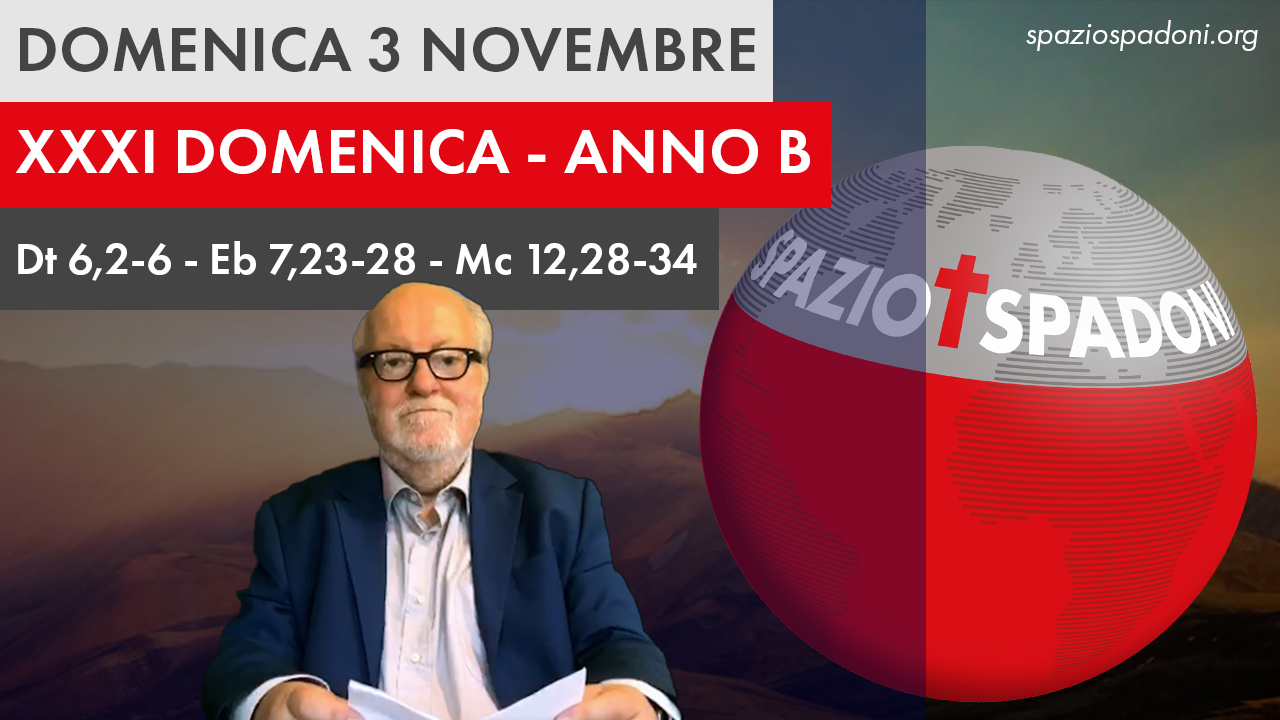
Sunday XXXI Year B – One Love
Readings: Deut. 6:2-6; Heb. 7:23-28; Mk. 12:28-34
In today’s Gospel (Mk. 12:28-34) a classic rabbinic “torment” is put to Jesus: which was “the greatest” commandment, the one that could sum up all the Law and the Prophets (Mt. 22:40). In fact, the Talmud said that Moses was given as many as 613 commandments, 365 negative (the number of days in the year) and 248 positive (the number of members of the human body). The theme is very timely: what is essential and truly urgent in the life of faith?
Jesus answers by amalgamating the command of total love to God (First Reading: Deut. 6:2-6) with that of loving one’s neighbor as oneself (Lev. 19:18). Unlike Matthew who, in the parallel passage, speaks simply of a “first” and a “second” commandment (Mt 22:37-38), Mark adds that they form a single precept: “There is no other commandment (ed.: singular) more important than this one” (Mk 12:31; cf. Lk 10:27).
Love of God is the origin and foundation of love of neighbor (Jn 13:34; 15:12; 1 Jn 4:7-19), but love of neighbor is the concretization of love of God. Benedict XVI expresses this in stupendous words in his Encyclical “Deus caritas est”: “’If anyone should say, I love God, and hate his brother, he is a liar. For he who does not love his brother whom he sees cannot love God whom he does not see” (1 John 4:20)… The inseparable connection between love of God and love of neighbor is emphasized. Both are so closely related that the affirmation of God’s love becomes a lie if man closes himself to his neighbor… Love of neighbor is a way to encounter God as well, and closing one’s eyes to one’s neighbor makes one blind even to God” (no. 16).
We must therefore be serious: there is no faith in God that does not translate into passion for our brothers and sisters. “We need to recall, in a special way, the great parable of the Last Judgment (cf. Mt 25:31-46), in which love becomes the criterion for the final decision on the value or disvalue of a human life. Jesus identifies with the needy: the hungry, the thirsty, the stranger, the naked, the sick, the imprisoned. <<Every time you did these things to one of the least of these brothers of mine, you did it to me>> (Mt 25:40). Love of God and love of neighbor come together: in the least of these we meet Jesus himself and in Jesus we meet God” (id., no. 15).
“If in my life I neglect concern for others, wanting to be merely ‘pious’ and fulfill my ‘religious duties,’ then my relationship with God also dries up… Only my willingness to go out to meet my neighbor, to show him love, makes me sensitive even before God. Only service to my neighbor opens my eyes to what God is doing for me and how He loves me. The saints-think for example of Blessed Teresa of Calcutta-drew their ability to love their neighbor, in an ever new way, from their encounter with the Eucharistic Lord, and reciprocally this encounter acquired its realism and depth precisely in their service to others” (id., no. 18).
The ending of today’s Gospel leaves us bewildered: “You are not far from the Kingdom of God” (Mk. 12:34); a response similar to that given to the “rich young man”: “One thing you lack” (Mk. 10:21). Loving is not enough: it requires following Christ, the God-man, in whom the Love of God and neighbor reach perfect unity. It is he, “the Son made perfect forever” (Second Reading: Heb 7:23-28), Love incarnate. He is the highest experience of the Father’s Love for us: in him we touch what God’s agapic, unfailing, total Love is (Jn. 3:16). And it is he who teaches us what it means to love our brothers and sisters: to “lay down one’s life for them” (Jn 15:13). “By this we have come to know love: he laid down his life for us; therefore we also must lay down our lives for the brethren” (1 Jn 3:16).
